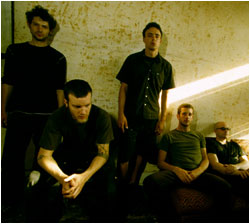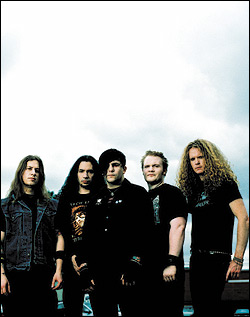EVERY DAY AT the Weekly, I probably rock 10 to 15 CDs. Not because, duh, writing about music keeps those ironic, skintight T’s and ball caps rollin’ in, but because, honestly, writing is the most solitary, painful, tedious procedure I’m aware of. I can’t concentrate in the relatively subdued, agreeable bustle of this office; I need incoherence, volume, and spirit, be it Missy and Marshall Mathers or GN’R and Godsmack. Depth is elective.
Writing creatively, solely for myself, is a far more selective endeavor. I recall a reading at Elliott Bay in which hulking Fight Club mastermind Chuck Palahniuk claimed that he listened to Nine Inch Nails’ remix EP Fixed ad infinitum, in sequence, the entire time he was penning Lullaby. The clanging, disruptive dissonance put him in the comparably perverse frame of mind required to compose his first horror novel. I’m no Palahniuk, no Gabriel García MárquezI’m not even Ethan Hawke. But when I ascend to the grand literary heights of the soon-to-be-former Mr. Uma’s The Hottest State, I’ll have Isis to thank.
The Massachusetts quintet’s most recent full-length, 2002’s Oceanic (Ipecac), is the most devastating, massive, yet genuinely pensive exercise in metal repetition I know. Many of the protracted dirges (seven of nine songs clock in at over six minutes) are propelled simply and forcefully by percussive headbanger grooves. Yet graduallyso much so that one can barely recognize the modificationseach is textured by tribal, hypnotic drums and subtly hellish electronic embellishments. Isis aren’t just a carpet bombing; they’re also the terrifying ambience between explosions.
Vocalist/guitarist Aaron Turner enters the fray unpredictably, shouting unintelligibly about the irrepressibility of water. The passages in Oceanic‘s liner notes are merely suggestions of a greater aquatic narrative that he prefers not to fully expound upon. “I like the idea of listening to the music in conjunction with reading the text,” he says. If Turner fessed up, Isis could easily gobble up plenty of the Mars Volta’s high-concept-insatiable audience.
I can live without those specifics. If I’m going to attempt to write with any measure of imagination, introspection, or darkness, Oceanic is a must. The music settles me to a point where it can occupy the recesses of my headphones but just as frequently unnerves me enough to trigger more unpleasant, challenging emotions. What elevates Isis above their Cookie Monster contemporaries is not only a devotion to evolving beyond hard-ass genre constraints but the courage to tour with decidedly nonhardcore curiosities like Dalek and now the cosmic, discordant Scots of Mogwai.
“We’re in a state of flux,” Turner says. “Electronics, ambience, and atmosphere have become a bigger part of our music. After a while, just playing with hardcore bands and metal bands exclusively felt sort of limiting,” Turner says. “When we got the opportunity to do headlining tours and pick other bands that could go with us, we chose bands we had some sort of commonality with but didn’t necessarily sound like. With Mogwai, there are things about their sound that have influenced us, and while we don’t occupy exactly the same genre, I think both bands share a common vision to a certain degree.”
Indeed, the Mogwai/Isis dichotomy isn’t really that divergent. Both bands pile hefty sandbags of cynicism behind a hail of white noise; Mogwai’s soundscapes just happen to be far more lush and far less adrenalized. Turner is, after all, the founder of Hydra Head, the Boston label that took great steps in diversifying hardcore. Yet Isis care little for the flagrant technical prowess that many of the label’s math-metal breadwinners flaunt.
“I think there’s something to be said for sensory overload,” Turner says. “But even beyond music, people are constantly bombarded with complex imagery. A lot of bands are focusing on how fast and technical they can be. For us, it feels more natural to move in the opposite direction for something that’s more contemplative and meditative.”
THEN THERE ARE the times when Isis grab the collar of one power riff and throttle it to death. “I don’t know whether it’s some sort of animalistic primal urge or desire to have that ritualistic vibe going on in the music, but it’s something I’ve always been driven towards,” Turner says. “We all like hip-hop across the board, which is obviously something tribal in feel, with very repetitive hooks and rhythms, and it’s definitely influenced our music. Beyond that, I think there’s other stuff that has similar aesthetics that we like, too, whether it’s techno or industrial or even other bands of the same heavy realm like Neurosis, the Melvins, or Godflesh, who also have elements of repetition in their music.”
The Neurosis similarity, spawned mostly by Isis’ early releases, is actually weighing down one of Turner’s many ambitions: applying visual stimuli to the focused blast of the live show. “Film-oriented stuff is just so much more expensive and inaccessible than, say, print media,” Turner says. “We’ve yet to meet a filmmaker that does stuff that we really like who would be willing to spend a lot of time on something for very little money. And beyond that, from the beginning we got tagged with the Neurosis comparison, and they’re one of the few bands in the heavy realm that’s ever done anything visual in the live setting.
“It’s the same basic instrumentation: two guitars, bass, drums, and electronics, and the music is slow, heavy, and sort of psychedelic. Bringing projection to the live setting would draw too close of a comparison in people’s minds.” For a band named after the Egyptian goddess of rebirtha renowned magician at thatnew tricks shouldn’t be a problem.
Isis play with Mogwai and Cobra High at the Showbox, 8 p.m., Thursday, Sept. 25. $13 adv./$15.







